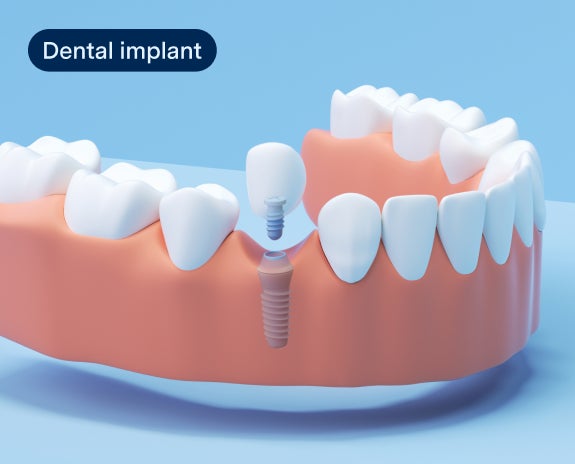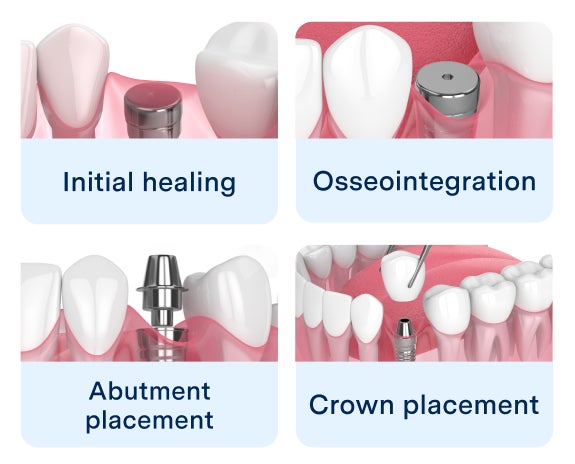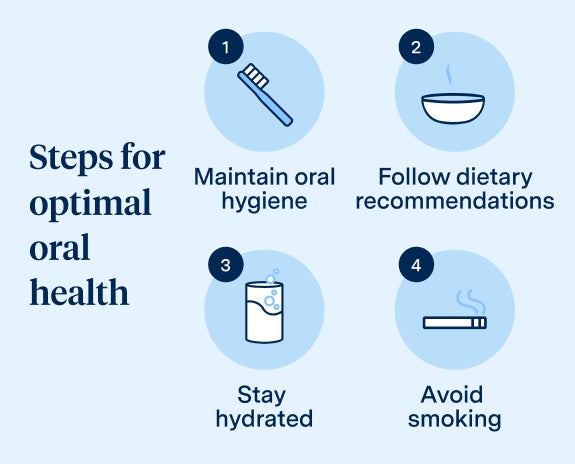Last updated 01.13.2025
Dental Implants Recovery and Healing
Recovering from dental implants is vital for your smile. Learn about healing stages, side effects, and recovery tips.

Getting a dental implant is an empowering step toward achieving the smile you’ve always wanted. However, an essential part of this journey is the recovery process after the surgery.
Proper healing is critical not only for your comfort and health but also to ensure the longevity and effectiveness of your tooth implant.
If you've recently undergone dental implant surgery or are curious about what the post-procedure journey may look like, read on to learn about healing and recovery.
Importance of dental implant recovery
After receiving dental implants, following your clinician's and oral surgeon’s aftercare instructions is vital. Their guidance is designed to help support a healthy recovery with minimal challenges and potential risks during the process.
Proper care can significantly reduce the risk of complications and enhance the success rate of your implants. The healing process is a journey that requires patience and adherence to best practices outlined by your dental professional.

What is the recovery time for dental implants?
The recovery time for dental implants typically ranges from a few weeks to several months, depending on various factors. While each patient's situation is unique, several elements can influence healing time, including:
Type of implant: Different types of implants may have varying recovery times.
Bone health: The health and density of the jawbone can directly affect how quickly the implant integrates.
Overall health: Your general health and ability to heal play a significant role in recovery.
On average, most patients can expect the initial healing phase to take about 1-2 weeks, with complete osseointegration (the process of the implant fusing with the bone) taking anywhere from 3 to 6 months.
Dental implant healing stages
Throughout the healing process, you’ll experience several stages that helps the implant fuse successfully with the jawbone. Understanding these stages can help manage expectations and provide insight into the recovery journey.
1. Initial healing
The first stage occurs right after the surgery. During this phase, you may experience swelling and discomfort, which is normal. Following your dentist's instructions regarding pain management and care for the surgical site is essential during this initial healing period.
2. Osseointegration
The second stage, osseointegration, is where the dental implants fuse into the jawbone. Over the next few months, the implant will bond with the jawbone, also called “osseointegration”. This is a critical phase that requires proper care, including maintaining oral hygiene and following dietary recommendations to avoid putting too much pressure on the implant.
3. Abutment placement
Once osseointegration is complete, the next step is the placement of the abutment, a small connector that will hold the connector that the crown is connected to. This procedure is typically quick and may require only local anesthesia. After placement, you may experience a short recovery period as the area heals.
4. Crown placement
The final stage is the placement of the crown. Once the healing is complete, and your dentist confirms that everything is in order, your custom crown is affixed to the abutment, completing your dental implant journey. At this point, you’ll be able to enjoy your new smile fully.

Side effects of dental implants
As with any surgical procedure, there may be some side effects associated with dental implants. However, they are generally mild and manageable. A common side effect, generally, is discomfort around the implant site.
This side effect usually resolves within a few days to a week, but if it persists or worsens, contact your Aspen Dental care team for guidance.
Read more about the safety of dental implants here >

Tips for a healthy dental implant recovery
To ensure a smooth recovery from your dental implant surgery, consider the following tips:
Maintain oral hygiene: Keep your mouth healthy and clean by gently brushing and flossing around the implant site once cleared by your dentist.
Follow dietary recommendations: Stick to soft foods initially and avoid hard or crunchy items that may put stress on the implant.
Stay hydrated: Drink plenty of water to aid in the healing process.
Avoid smoking: Smoking can hinder recovery and increase the risk of complications.
By adhering to these best practices, you can help support the success of your dental implants.

Dental implant recovery FAQs
Can I smoke after getting dental implants?
It is highly recommended to avoid smoking after getting dental implants, as it can hinder the healing process and increase the risk of implant failure.
How long does it take for dental implants to heal completely?
Complete healing for dental implants can take anywhere from a few weeks to several months, depending on individual circumstances, including bone quality and overall health.
What happens if my implants fail?
In the rare event that your dental implants fail, it’s important to consult your dental professional immediately. They will assess the situation and recommend appropriate next steps. For more information on failed dental implants, visit this page. It’s important to know that that implants have a 98% success rate. It’s rare for an implant to fail.

Aspen Dental is with you every step of the way
While the journey to getting dental implants involves multiple stages and requires commitment to recovery, the end result is a beautiful, functional smile that feels like natural teeth. If you’re ready to take this exciting step, don’t hesitate to schedule an appointment with us today at Aspen Dental.



